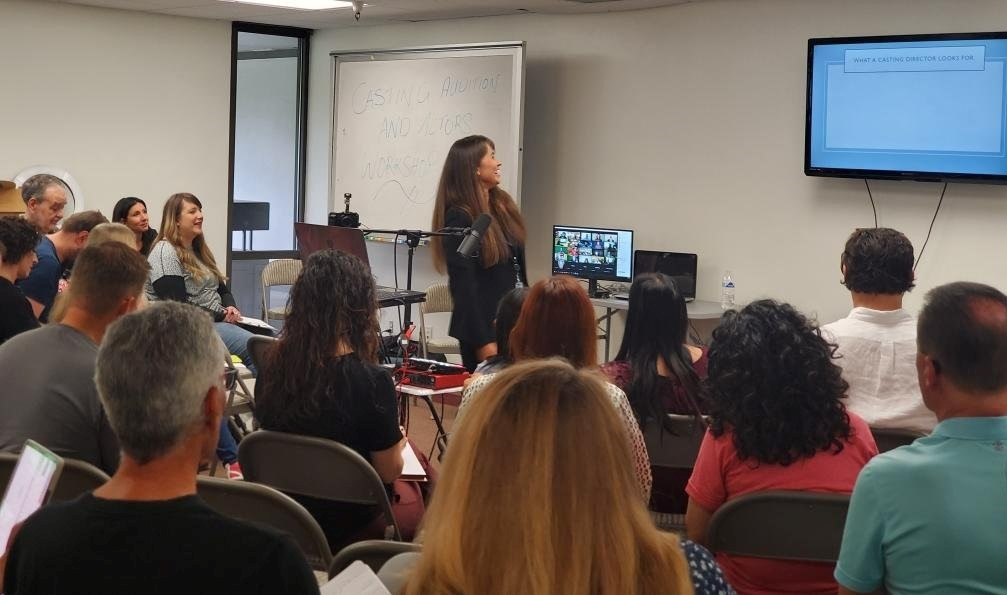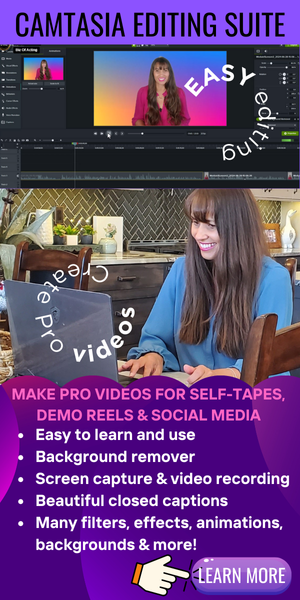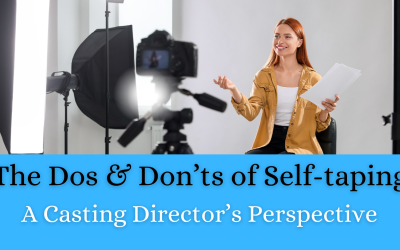HOW TO GET AN AGENT
As an on-screen actor – A Step by Step Guide
There are some important things to consider before looking for an agent. Being well prepared for when you need one will set you up for success.
In this article you’re going to learn:
-
- The pros and cons of having an agent
- The difference between an agent and a manager
- How to get an agent and when
- How to prepare for an interview
- What to expect at an interview
Do You Need an Agent?
Eventually you will need an agent if you want to land the higher paying and more prestigious jobs. But it all comes down to what your goals are. I know people that float around and find independent work on their own in between their regular job, and this works for them. They’re not looking for anything else but maybe a side hustle to earn them some extra income.

The interesting thing about this is that once you get a taste of being in a production, it’s like a magnet is switched on and you are attracted to this new world of filmmaking. Many actors fall in love with the craft of acting and the creation of stories. There is an energy and vibe that comes with being on a film set. That’s when people start to take acting more seriously, and its then that they look for how to take their acting career to the next level. An agent becomes valuable and a desired commodity to reach those goals. Talent agents are the gatekeepers to the best opportunities to help you make a rewarding and successful career out of it.
I’ve learned to invest and pay professionals for their expertise so I can become an expert in my field. And that’s what you are doing when you sign on with an agent. They are the professionals in finding you the opportunities and you will pay them a commission for the work you book.
1.
Pros & Cons of Having an Agent
PROS:
-
- a) Access to Auditions: One of the biggest advantages of having an agent is gaining access to auditions that are not available to the public. Agents have connections to casting directors, production companies and brands, which opens the door to more prestigious and competitive roles. When I was a talent booker for a very large agency, I had access to all the casting jobs you see on TV, at the movie theater, and on streaming platforms like Netflix, Amazon Prime and Disney. Many of these casting jobs are not posted out to unrepresented talent. Only agents have access to these. Casting Directors typically will only work through Talent agents and Managers on the big productions. 3 of the big-name casting platforms are Casting Networks, Actors Access and Backstage. You will need an online profile set up on these platforms and also be connected with your agents roster in order for an agent to submit you for these productions.
- b) Industry Expertise: Agents are industry insiders. They know the market, understand trends, and have relationships with casting professionals and some have exclusive agreements with production companies. This expertise helps guide your career in the right direction, giving you better chances at landing roles that suit your skills.
- c) Negotiation Support: When it comes to contracts, payment, and legal matters, agents are your advocates. They negotiate on your behalf, ensuring that you get fair compensation and favorable terms. Without an agent, you may not be aware of the rights you should protect. I see many actors get taken advantage of because they don’t know the correct protocols and what happens when a change is made that is different from their contract.
- d) Career Growth: A good agent will look beyond individual roles and think strategically about your long-term career. They will focus on your strengths and goals. They’ll help you avoid being typecast, connect you with the right people, and identify opportunities to grow as an actor.
- e) Credibility and Trust: As a casting director when I see an actor is represented by an agent it also tells me that I can trust this actor more-because they have been vetted by their agent first. An agent will make sure that the actor knows the protocols and is professional at every step. So, having representation can give you more credibility in the eyes of a casting director. It signals that you are a professional actor serious about your career and you have been trained well. The casting director will lean more toward a represented talent than one that is not.
As an example, I had an unrepresented actor cast in a brand anthem commercial from a production company that was flying in from Canada. We had callbacks, confirmed availability and booked him, but on the day of the shoot, the actor contacted me by email to say he couldn’t make it saying, he didn’t feel confident to do it. It’s that moment that every casting director dreads to hear and it was happening right at that moment. And yes, you panic but maintain composure quickly. This was one of the most unprofessional and disappointing situations from an actor. It was the only instance that this has happened in my career – thank goodness!
I can’t even explain the mayhem this caused production and myself. There was no accountability on the actors part – at all! It cost production thousands of dollars – that was not in the budget, valuable time and unnecessary stress while we quickly cast another talent in a rush situation. It affected so many things. Needless to say, I will never work with this actor again and it also makes me extra cautious when considering an actor that is not represented.
Trust is a major factor. I took a chance on an unrepresented talent, but he crumbled at the last minute. Productions expect pro level actors – not just for their acting ability but how they run their business as a professional. Becoming a top-level acting professional is why I created the Biz of Acting Master Course. Most actors are not always business minded and it’s something you need to learn in order to navigate this industry as an actor. You are a business – a brand if you will and you need to know how to operate it. This business course is packed with information I think all actors should know.
Cons:
- a) Commission Fees: Agents make their money by taking a commission of the work you book. It’s usually around 10-20% of your earnings. Each time you book a job the payment is typically received by your agent who keeps a portion of your paycheck and the rest is yours. You will likely need to pay income tax on the income you receive so keep that in mind also (Paying taxes is required no matter if you are represented by an agent or not – Uncle Sam needs to be paid too. Check with your tax professional). While the agent commission is a standard fee, it can feel like a downside, but most professional actors see the value of their agent and know that without them they wouldn’t have as many opportunities. It is a worthy cost of the business.

- b) Less Control: Your agent will send you out on auditions or request a self-tape from you that aligns with their vision of your career. This can be an interesting predicament because how you see yourself may not always be how the agent or casting sees you. This means you may have less control over the types of roles you’re pursuing, as your agent might prioritize certain projects or casting opportunities.

- c) Long Wait Times: Agents are busy managing multiple clients, so it can sometimes take a while for them to respond to your inquiries. Patience and understanding is required. There may be times when you might feel frustrated if your career isn’t advancing as quickly as you’d like.
- d) Contract Obligations: Once you sign with an agent, you’ll be bound by the contract for a set period within a geographical area. Your contract may auto-renew each year. If things aren’t working out, it can be difficult to terminate the relationship, potentially leaving you stuck without new opportunities during that time. Read your talent contract carefully, noting how you can cancel the contract, if needed.


- e) Hard to Get: It’s often difficult to land a reputable agent in the first place, especially if you’re new to the industry. Many agents only take on actors with an established resume and reel, or who come highly recommended, making the process competitive. Don’t give up though. Sometimes it can be a ‘no’ right now but later that could change. Look at other options to.
2.
Talent Agent vs. Talent Manager:
What’s the Difference?
Talent Agent:
A talent agent is a professional who is primarily responsible for helping actors find work. They submit you for auditions, negotiate contracts, and ensure you get paid. Their main focus is to help you secure acting jobs and manage the business side of your acting career.
- Main Duties:
- Submitting you for auditions and casting calls.
- Negotiating contracts and ensuring fair pay.
- Managing bookings and logistics for jobs.
- Representing you in the professional acting world.
- Compensation: As mentioned before, agents typically take a commission from your earnings, usually around 10-20%, depending on the contract.
- Regulation: Agents must be licensed and or bonded in many states and are regulated by industry guilds like SAG-AFTRA. Many agencies outside of California and New York are non-franchised, especially in right-to-work States.
Talent Manager
A talent manager, on the other hand, takes a broader and more personalized approach to your career. They focus on long-term career development, providing guidance on everything from which roles to pursue to how you should present yourself publicly and what’s in line with your personal branding. There’s more micro-managing going on. Managers often handle the day-to-day aspects of your career, helping you build your brand and navigate your professional growth. You’ll often hear celebrities say, ‘I’ll talk with my manager”. But you don’t have to have celebrity status to have a manager. Some newer actors want to excel in their career quickly and a manager will guide them accordingly.
If an aspiring talent has something unique and they are in demand – this is another situation where a manager makes sense. Some talent can become inundated with opportunities and a manager will sieve through the best opportunities from the not so good ones that do not support their growth, branding and values. Actors that are also influencers often fall into this category.
- Main Duties:
- Offering career advice and guidance.
- Helping you with branding, image, and professional decisions.
- Introducing you to potential agents, casting directors, and other industry professionals.
- Developing long-term strategies for your career growth.
- Compensation: Managers usually take a higher percentage of your earnings than agents, often around 15-30%. They may also have a sliding pay scale that is capped at a certain earning rate then the percentage of earnings is tiered down. The rate is usually higher because a talent manager provides you with more personalized attention than an agent will or can.
- Regulation: Unlike some agents, managers are not required to be licensed, and they are generally not regulated by industry guilds. Their role is more flexible and advisory.
Key Differences:
- Scope: Agents focus on booking jobs, while managers focus on overall career strategy.
- Regulation: Agents who are part of the union must be licensed and follow strict guidelines, whereas managers do not have the same level of regulation.
- Compensation: Managers often take a slightly higher percentage than agents, but they offer more comprehensive career support.
3.
What is an Agent Looking for?
Think like an Agent
To first put things into perspective, talent agencies are commission-based businesses. They make money on booking talent. That means they are going to represent talent that are ready to book. This is more important than you think. Step into their shoes for a minute and think about who you would want on your roster (if you were an agent)? Is this person going to book jobs and make money for the business. What makes financial sense?
With your ‘Agent’ hat on…would you be hiring someone that is new that doesn’t have much training or experience behind them but maybe has a great look? Or would you represent someone that has a full resume, pro demo reel, great looking profiles, and presents themselves in a professional manner? Which one is going to start making money the quickest and has longevity? That’s what an agent is thinking. Who can book jobs now and consistently? Who can represent the agency well? Who can be trusted and will not let you down? Do they have professionalism and know the casting flow and film etiquette? Agents are not there to train you to become an actor. You should already be at that level through your experience and education.
Looks matter, but the great thing is that productions are looking for so many looks, age ranges, accents, and Ethnicities with varying skills. Some agencies may have a set number of looks for type casting. Personally, I wouldn’t let that stop you from applying because you are going to be unique in other ways. Some people think you have to be a beautiful person with ripped abs – that’s modeling, not acting. I suggest you take a look at some commercials, shows and films and look for all the ordinary and ugly people for some motivation. All types, sizes and looks are needed. Start preparing now so you can be ready for an agent to consider you.
The right time to look for an agent is when you have:
- A good amount of on-screen acting experience and copies of the clips you’ve been cast in
- You have been in professional actor training – at least a year or more
- A demo reel put together from the projects you’ve been cast in
- An online profile on at least one or two casting platforms. I have a full video on how to populate your online profile in the Biz of Acting Master Course.
- Professional headshots with at least 2 different looks
- Actor resume
4.
How to Prepare for an Agent
Hone in on your acting skills and learn different styles of acting. You should do scene study, improvisation, continuous action, self-tape technique, comedy and learn the different acting styles for Theatrical and Commercial. Take regular acting classes and powerhouse workshops from industry professionals when you can.
Yes, it’s an investment but you will learn quickly, make connections and it’s something you can add to your resume. If you can’t attend classes in person then get coached online. Through networking and research you’ll be able to find online group sessions and private coaching options available to you. The US Talent Academy offers some excellent training programs with certifications in different genres (Film, TV and Commercials).

Take classes in:
- Scene study
- Improvisation
- Continuous action
- Self-tape technique
- Theatrical (Film & Episodic)
- Commercial (Commercials & Industrials)
- Comedy
- Workshops with Industry professionals
a) Your portfolio
There are 3 main portfolio tools you will need to present to the agent. A professional headshot, acting resume, and a demo reel. They may want you to send these to them using an online application form. By the time you meet with an agent you’ll have these 3 tools ready for an agent to review. These materials will help an agent decide if you are someone they want to represent, so aim to impress!
- Headshot: Your headshot is not a photo of you taken at wedding with the background removed, but a dedicated headshot taken by a professional photographer that specializes in headshot photography. It is cropped and framed correctly. Your headshot is where you make a first impression, so invest wisely. I have more on this in my blog post ‘Actor Tools of the Trade’. Your headshot should accurately represent you and your acting type.
- Acting Resume: Include your specs (height, weight, ethnicity), acting experience, training and special skills (like languages or accents), and any independent and union affiliations (SAG-AFTRA, for example). I really like it when an actor puts a thumbnail image of their professional headshot at the top of their resume.
- Demo Reel: Demo reels are a must have by the time you are seeking an agent. If you are signed on with an agent your demo reel is a major marketing piece not only for the agent to make a decision on you, but also to show the casting director, and their client, that you have the acting chops before they extend an invite for you to self-tape. Demo reels are powerful! Casting directors like to see how you act, move and sound. Make sure you pick your best clips that highlight your acting strengths. Reels are typically 1 to 2 minutes long and start right away with you – not the other actor. Don’t make a long intro with your name and headshot – just go straight into your best clips and add your name and headshot at the end, or your name can be a text overlay in the lower part of the reel. Casting directors don’t have a lot of time and just want the ‘meat and potatoes’ quickly.
b) Research Potential Agents
As you research you may come across agencies that specialize in a particular niche. You’ll find Theatrical agents or some that are Commercial agents, and some do both. Do an initial online search and take a look at their client list (roster), their successes, social media presence, reviews, reputation, are they securing jobs for their actors that are similar to the ones you’re interested in.
Also glean their ‘About’ page so you can get to know the agents. This is great information to use during your submission to draw on things that you both may have interests in or you can bring up in conversation. Find out whether they accept submissions from new actors and how they want an application received. It’s a good idea to network with other actors that are currently represented and ask them what they think of their agent, if they would recommend them or not, and why?
c) Submit to Agents
Agencies are going to have their own way of accepting talent submissions so be sure to follow their guidelines. Their website should have instructions, otherwise send them a message. A busy agent prefers not to receive phone calls from actors looking for representation but you could call if you’re not receiving a response using their method.
They will likely ask for your portfolio information and for your social handles. Do a purge on your social accounts if you need to in order to make a great impression. You may also want to include a brief cover letter that explains why you’d be a good fit for their agency.
- Cover letter/Email: Keep it professional and in a formal tone – and not overly long. Address the appropriate person, if possible, and check for grammatical errors.
- Personalize it: Personalize your submission email to each agent you contact and why you’re interested in working with them specifically. Avoid sounding like an automated robot.
d) Attend Networking Events
You can’t be a hermit in this industry. You will be most effective if you are ‘up and at em’ when it comes to industry events. Facebook groups are great for finding out upcoming events. Check out your local Film Commission, Motion Picture Association (MPA) and local meetup groups to learn about showcases, workshops and film festivals. This is where you will meet some of the best industry professionals and a chance to get in front of agents, casting directors, producers, writers, directors, celebrity actors and other notable people. This is a great way to get more exposure that may increase your chances of being noticed by someone that could make a difference in your career.

If you are still fairly new to acting and need demo reel material – inquire at your local college or university film department and ask when they hold their open calls for student films or how to submit a self-tape. You can use clips from student films (that are made well) for creating a demo reel. I always recommend being in student films from intermediate to advanced students because they are more familiar with the equipment, editing software and artistic abilities.
Networking Tips:
- No. 1 Be a listener. Learn what you can from others.
- Be professional and approachable. It’s honestly like meeting strangers and can feel awkward but be positive and complementary. You don’t even need to talk about the industry to start with. Just be yourself. Bring a friend if you can. You’re all there for the same reason.
- Have business cards or a digital card ready with your contact information. I don’t recommend brining your resume and headshot but rather a link to your online profile.
- Connect with people on social media while you’re with them and follow up with anyone you meet who shows interest in your career
e) Casting Platforms and Which Ones Agents & Casting Directors use:
Many agents and casting directors use online casting platforms like:
Backstage
Casting Networks and
Actors Access
Create a strong profile on these sites, upload your headshot, resume, and demo reel, and start submitting to casting calls. On the Biz of Acting Master Course I give you step by step instruction on how to create an online profile to impress the casting director.
Even if you don’t have an agent yet, these platforms can help you build your resume with small roles, commercials, or student films. Agents are more likely to take notice if they see you actively booking work.
f) Be Persistent and Professional
After submitting to agencies, it’s normal to experience radio silence. Agents have so many wheels turning and the industry is competitive. Agents receive countless submissions and they won’t be able to take everyone on. If you don’t hear back, it’s okay to follow up once, but make sure to be professional and respectful of their time. A quick follow up email is good. It’s also important to continue working on your craft and building your resume while waiting.
g) Stay Positive and Be Patient
I know that’s harder said than done. Getting an agent can take time, and rejection is part of the process. You will hear more No’s than Yes’s in this industry. That’s normal so be sure to celebrate the Yes’s big time…well not too big. You don’t want to blow it :). Stay positive, patient, and persistent. Remember, the right agent will not only help you get auditions but will also guide your career in the long term. Keep your chin up and focus on the goal. Remember to enjoy the process. Life itself is for learning, growing and improving.
IMPORTANT NOTE:
I want to be very clear in saying that if an agency responds to your application and says there is an upfront fee – then you should run and never look back. Agents make money on commissions only. I have heard from talent that they were asked to pay a fee between $1000 to $1500 as an initiation fee plus a photographer fee. This is a big no no. You should never be charged any type of initiation fee, and you should never be obligated to use a specific photographer or trainer. Agents can make suggestions to resources but not force you to use specific services as part of you signing with them. Be cautious and mindful.
5.
What To Expect At An Interview With An Agent
Every agent is going to be a little different but it’s important that you know how to get an agent and a big part of that is knowing what to expect. The agent may change things up based on what you are giving them and what they know of you. Come prepared with a couple of monologues and be ready for a cold-read. This is a script given to you at the interview that they may have you to perform.
Interview Preparation:
- Print your headshot and resume.
- Prepare 2-3 contrasting monologues.
- Be ready for a cold read.
- Dress smart casual, with natural makeup for women.
- Maintain a great attitude and be teachable.
During the Interview:
- Assess if the agency is a good fit for you.
- Be honest and avoid exaggerating your experience.
- Demonstrate reliability and professionalism.
Here are some other things that may be discussed:
- Your resume
- Your experience and the roles you played and who you worked with
- Type casting – how you see you, and how they see you
- Your training and the types of training you’ve taken
- Extra skills you have such as musical abilities, dance, sports, languages, achievements etc.
- Your unique personality and qualities
- Discuss any tattoos or scars. These aren’t bad, they just need to know
- Your demo reel and acting level
- Your headshot (your headshot should look like you right now)
- Your social media accounts and if you’re an influencer in a particular niche
- Your online profiles
- Formatting your materials and online presence if signed on
- IMDb profile
- Are you willing to dye or cut your hair, or beard (if you’re a man)
- Union status (are you a SAG-AFTRA member or Eligible)
- Casting opportunities for theatrical or commercial work
- Your current profession or what keeps you busy during the day
- What your schedule is like
- Your goals and how passionate you are. The direction you want to take your career
- Any limitations or things they should be aware of
- Your self-tape setup
- They’ll be noting your mannerisms, professionalism, confidence and integrity (can they trust you?)
- Your response time and how punctual you can be – understanding that time is of the essence
- The contract: length, geographics, for commercial, theatrical work etc.
- What happens when you find work on your own
- How to cancel the contract
- Their expectations of you and what you can expect from them
- If you are represented by other agents or have a manager
- Agency protocols and what to expect in the initial setup
I know…the list is long. You may not cover all these things but you should be prepared to cover any one of these topics.
Attitude, confidence and positivity is going to go a long way. Don’t go in there thinking you’re the ‘bee’s knees’. If you come across as cocky and arrogant it might be a short interview, and some agents aren’t too shy to tell you. Agents can’t work with this, and if they can’t then a director certainly won’t. It never works out well for anyone. Be courteous and value their time. This relationship is about supporting each other. You are a team about to make great things happen. Honor the relationship. You want the agent to feel good about you. Leave them impressed.

Dress smart casual. Look professional and well put together. For the ladies wear makeup that is natural looking. A blank canvas is best meaning, if you wear heavy makeup or facial piercings tone it back or nothing at all. An agent will see this as a limitation otherwise, and it makes it hard to market you for varying roles. Production can add these elements if this is part of the character you are playing. Don’t limit your marketability.
Be yourself and let your personality shine through. Be engaged and listen, be interested in what they have to say and take any advice as golden nuggets. They know what works and what doesn’t. If they give you feedback and it’s uncomfortable, they are not trying to offend you but giving you suggestions for improvement. In this industry you will grow a thick skin. Expect criticism, not to criticize you personally, but as a professional that is open to improvement.
Remember to find out what you can about the agent you are meeting with to find common ground on a personal level. People love it when you have gone out of your way to do some research and want to know more about them and their company.
Before leaving find out when you should hear back from them. Some agents may need time to evaluate whether you are a good fit and they may decide to sign you on the spot. If so, make sure you have enough time to go over the contract or have them explain it to you. You must understand what you are signing up for.
Congratulations on getting signed! This is a great stage in your career path!
Final Thoughts About How To Get An Agent
Finding the right agent that will help propel your career to the next level. It’s a big step in the right direction and a decision not to be taken lightly. Follow your instincts and get a good feel for the agency. You may have the opportunity to meet with more than one agency that is willing to represent you. Don’t take that for granted and go with what is best for your future.
Continue to grow and persevere. Stay connected to your people. You know, the ones that celebrate your wins and are a shoulder to cry on when the heavy moments come. Keep pushing forward and soon enough momentum kicks in and you’re on a roll.















0 Comments